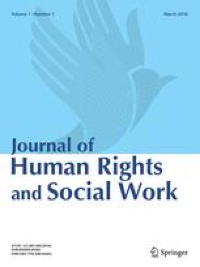 Authors: Michael Garkisch & Lauri Goldkind
Authors: Michael Garkisch & Lauri Goldkind
Abstract: Social work, as a human rights–based profession, is globally recognized as a profession committed to enhancing human well-being and helping meet the basic needs of all people, with a particular focus on those who are marginalized vulnerable, oppressed, or living in poverty. Artificial intelligence (AI), a sub-discipline of computer science, focuses on developing computers with decision-making capacity. The impacts of these two disciplines on each other and the ecosystems that social work is most concerned with have considerable unrealized potential. This systematic review aims to map the research landscape of social work AI scholarship. The authors analyzed the contents of 67 articles and used a qualitative analytic approach to code the literature, exploring how social work researchers investigate AI. We identified themes consistent with Staub-Bernasconi’s triple mandate, covering profession level, social agency (organizations), and clients. The literature has a striking gap or lack of empirical research about AI implementations or using AI strategies as a research method. We present the emergent themes (possibilities and risks) from the analysis as well as recommendations for future social work researchers. We propose an integrated model of Artificial Intelligence Enhanced Social Work (or “Artificial Social Work”), which proposes a marriage of social work practice and artificial intelligence tools. This model is based on our findings and informed by the triple mandate and the human rights framework.
Citation: Garkisch, M., Goldkind, L. Considering a Unified Model of Artificial Intelligence Enhanced Social Work: A Systematic Review. J. Hum. Rights Soc. Work (2024). https://doi.org/10.1007/s41134-024-00326-y
